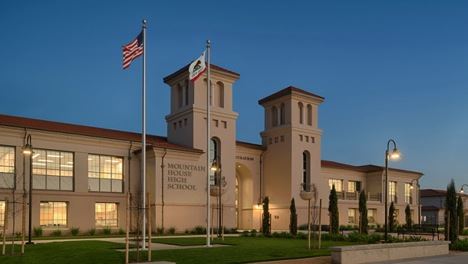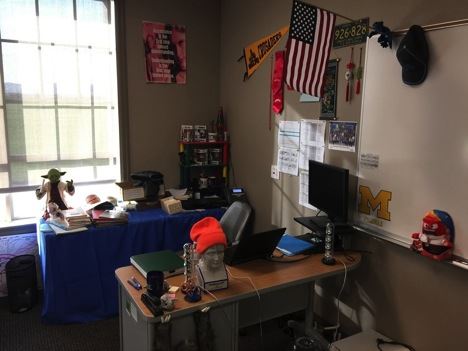School name: Mountain House High School, Mountain House, CA
 Type of school: 4-year high school--opened in 2014
Type of school: 4-year high school--opened in 2014
School locale: Depending upon your perspective, it is either far East Bay near Oakland and San Francisco, or far West Central Valley. Near both the Pacific Ocean and Yosemite, so a wonderful location.
Classes you teach: Advanced Placement Psychology, Psychology, and World History with Sociology on the horizon for next year. I have also taught World Religions, US Government, World Geography, Cultural Anthropology, Philosophy of Human Nature, History of Chicago, Hindu Literature, and Popular Culture.
Average class size: 26-36, average about 31
What’s the best advice about teaching you’ve ever received?
● Treat students with respect before you demand it from them. This little maxim has been a key to my success over the years. I begin by treating my students respectfully. Once I do this, I establish credibility, and over time, a reputation. This habit of respect means a lot when students know that my classroom is a safe place where they can take intellectual and emotional chances. For some, I am the only or one of a few safe adults in their lives. I want my kids to experience both the challenging aspects of academics, but also the kind side.
● No matter how sophisticated high school students look and speak, they are still children. Young adults, but still children. Despite any outward confidence or sophistication they may exhibit, there is still a little kid inside trying to figure out the world. On a recent note, I have about 25 stuffed animals in my classroom. They are very popular and the early kids search the room to find their favorites before class begins.
● Never berate a late student. You never know where they have just come from--they could be lazy, but they also could just have come from an abusive situation at home. Do not add insult to injury.
● Don’t take it personally. When students are acting out, I try to understand rather than judge. It is incredibly rare that a student acts out against me personally.
● Listen. When I complete a new activity or a unit where I’ve tried things out, I look to my students to offer me feedback about how I did and how the lesson could be improved. I have learned so much from my kids. They give me insights I could have never thought of on my own.
● Lose your ego--it’s not about you, it’s about the kids.
What book or article has shaped your work as a psychology teacher?
I’ve read too many psychology books to count. The biggest influence on my work as a psychology teacher has been my colleagues from other schools. While I will no doubt miss mentioning some people, I’ve learned countless lessons and insights from Kent Korek, Steve Jones, Barb Loverich, Drew Appleby, Rob McEntarffer, Karl Honma, Amy Ramponi, Kristin Whitlock, Randy Ernst, Ken Keith, Charlie Blair-Broeker, Jim Matiya, Doug Bernstein, Charles Brewer, David Myers, Martin Bolt, and so many more.
Briefly tell us about your favorite lecture topic or course to teach.
I rarely lecture, but when I do, I do so interactively. I’ve been teaching Advanced Placement Psychology in one form or another since 1992. I love that course. I appreciate those who can go into more detail with an advanced course, but I love introducing the field of psychology to high school students and their parents.
Briefly describe a favorite assignment or in-class activity.
Yes. All of them. Most have had a great deal of success over the years. But perhaps I like the ones that have failed. The frustration I experience is not pleasant when something fails, but it forces me to go back and see what I did wrong. And I do something wrong every day. Even after 30 years of teaching, I am still learning every day in terms of both content and pedagogy. On the first or second day of class, I nearly always use the Drew Appleby demonstration about deja vu from one of the Teaching Psychology Activity Books. However, I tend to use the demo for schemas, associational learning, and priming. When describing the meaning as we debrief how on earth I was able to get more than half the class to recall the same thing, I use a multi-colored netting I draw on the board to represent schema that grows more and more complex as they experience life. I then use schemas throughout the course to talk about how people’s understandings of behavior have changed as a result of learning new things.
What teaching and learning techniques work best for you?
Over the years is what works best for me does not necessarily work best for my students. Rather than focus on what I do best, which is interaction with students, I find that I have to adjust every semester and from class to class. I enjoy learning by reading and then viewing videos that supplement the reading, so I do incorporate a lot of that in my class. However, my ability to absorb information quickly is a skill that not all of my students have so I have to incorporate retrieval practice in my class. Using Kahoot is one example of that. The kids enjoy the games occasionally, but I resist it. Conversations about ideas is my personal favorite. Socratic questioning in those conversations are what I relish.
What’s your workspace like?
More organized than anywhere previously. I now work in a school that is nearly all digital. Most assignments are turned in online, so I do not carry around large folders of paper. The piles of papers are are now replaced with toys and stuffed animals. Going mainly paperless means retraining my brain and habits into a different ways of dealing with information. Like the entire staff here, we practically live with our laptops attached to us. At home, I have a nice set of tables with my Mac Mini and Macbook Pro and speakers so I can jam to my tunes. That said, because I have three different classes consecutively, I usually have at least 15 tabs open on my browser which can get pretty messy.

Three words that best describe your teaching style.
Involved, passionate, interactive
What is your teaching philosophy in 8 words or fewer?
Constructivist; always curious, learning, reflecting; no straight lines
Tell us about a teaching disaster (or embarrassment) you’ve had and how you dealt with the situation.
The first year I was teaching we were talking about myths about suicide. The myth was “people attempt suicide in order to get attention.” After a bit of discussion one student claimed that there was no way this was true--she knew because when she attempted suicide, it was a cry for help. A second student claimed that he attempted suicide in order to get attention. Needless to say, I was flabbergasted. Somehow, I pulled myself together enough to honor both statements and talk about how “attention” would best be defined by getting help. Not totally sure how I made it through that class.
What is something your students would be surprised to learn about you?
I’m not sure they would be surprised to learn anything as I am pretty much an open book. That said, I imagine that they would be surprised at how much I have experienced that could have negatively impacted my life and attitudes. Between family and students, I have experienced suicides, accidental deaths, funerals, wars, loss of limbs, loss of mental capacity, murders, rapes, hate crimes, cancers, weddings, more funerals than I can count, and more. Despite of that, or because of that, I continue to see the positive side of humanity and choose my attitudes rather than let my experiences choose my attitude for me.
What are you currently reading for pleasure?
I am in the midst of finishing writing an AP Psychology text/review book, so I have not been reading for pleasure. That said, I primarily read non-fiction related to history and the social sciences for pleasure. Occasionally, I read Thomas Perry novels and read A Song of Fire and Ice series a couple years ago. Between Facebook and Twitter, I read at least 15 articles a day on various social issues and research. For me, that is pleasure reading. Strange, I know.
What tech tool could you not live without?
Aside from a computer hooked to the internet? I’m big into Google Docs and Drive. Canvas is my current LMS and I love it. It provides a new way for organizing information and assignments--making me think differently. I rely heavily on Canvas for my AP Psych classes with the emphasis on testing. All my students have chromebooks, so I am converting much of my content into online formatting through Canvas. I just got a demonstration of Peardeck and was very impressed. I love YouTube for finding original footage of psych research. I love Twitter for communicating articles and quotes for my students. I love the Facebook groups I am in for collegial support and ideas. In short, I love tech that allows me to communicate complex ideas in efficient and effective ways. If the tool helps people learn, I tend to love it.
